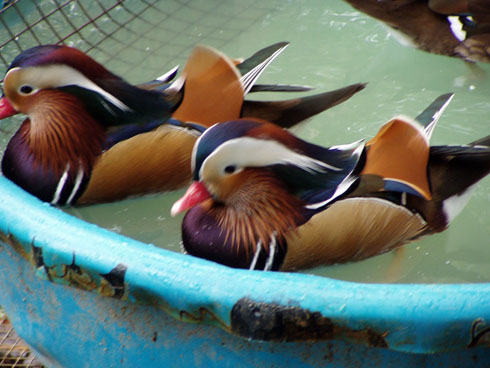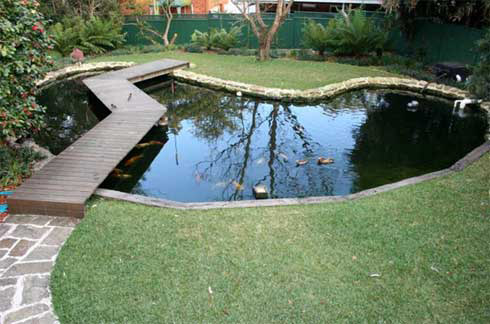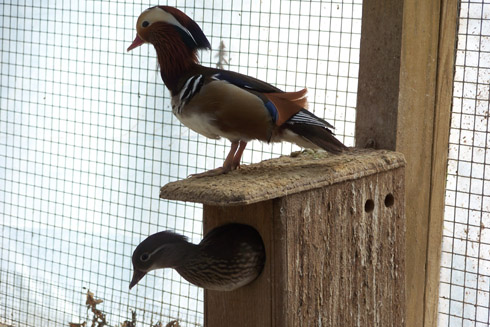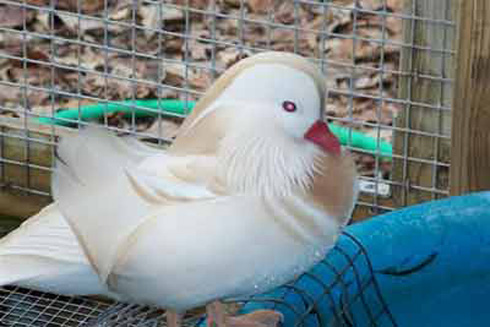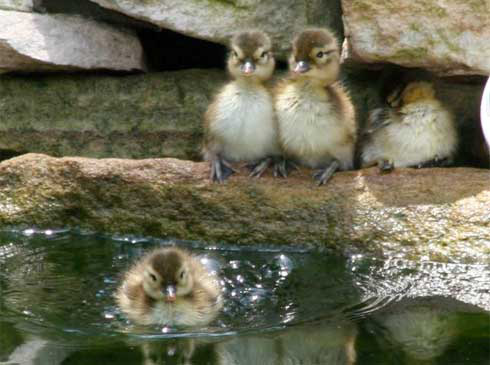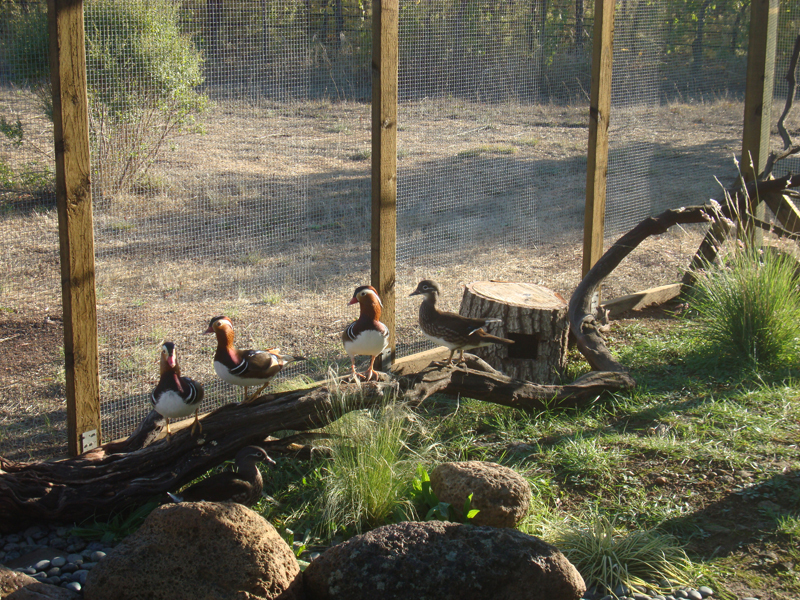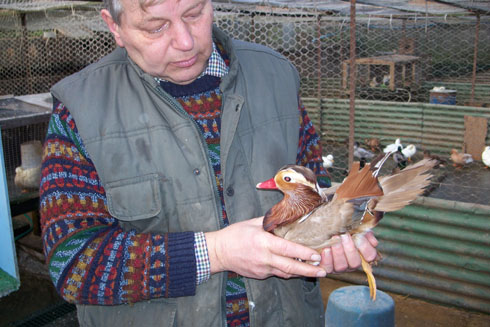 |

|
Currently there are no events or updates to display. |

More on Mandarins It has been more than 15 years since I resumed raising Mandarin ducks after an interruption of more than 20 years. I have done so because I have always been an admirer of the specie and because they were a replacement for the Calls I gave up for a number of years. Mandarins are stunning to the eye, easily kept in a suburban setting, and, unlike the Calls, present no noise problem even when kept in close proximity to surrounding homes.
The vaulted effect on the male's head is called a crest. It can be raised and lowered. The fan shaped feathers are modified secondaries called sails. The fine hair like feathers decending from the cheek area are called the mane.
Since it has been some time since I reported on what I am learning as I continue my breeding program for them, I decided that this would be good time to do an update. What follows is a list of my observations in no particular order.
This Coy pond in Australia is the home of a resident pair of Mandarins which raises ducklings on the pond yearly. Predation is not the problem in parts of Australia that it is in North America. Andrew Markham photo
The male stands guard as the female peeks out of the nestbox. When I last raised Mandarins, White Mandarins either didn’t exist in the U.S. or I didn’t know that they existed. White Mandarins present a beautiful contrast to the Normals. They also presented a challenge in terms of breeding. White Mandarins, you see, have a tendency to not want to begin eating as very young ducklings. I have heard of instances where between 50% and 100% of the ducklings are lost during their first week of life due to their failure to begin eating. That seemed to be true even when they were kept in the same brooders with Normal colored Mandarins and/or Calls. The solution seems simple and in fact is. Live meal worms fed within the first 48 hours of hatching will jump start their eating instinct and will greatly reduce losses. I lost only one White duckling this year and he was late hatched (relative to his clutch) and weak. Whites lay about as many eggs as Normals, are as fertile, and hatch about as well. White Mandarins which are allowed to hatch and raise their own young (at least for the first 1-2 weeks) see little to no losses due to eating problems. There is one other thing that differs between the Whites and Normals. The Whites tend to consistently hatch females in larger numbers than males in my experience. I have been told by a established breeder that he has not had that problem and if anything, tends to hatch more White males. The ratio for me has been 3 to 2. Since Mandarins almost always breed in pairs, that is not necessarily a good thing.
While not as brightly colored as the Normals, the White Mandarin is an elegant bird.
One thing I should mention about Mandarin ducklings (Wood Duck ducklings as well): they are champion jumpers. They can spring straight up a surprising distance. If your brooder is too shallow, they will pop right out of the top while you feed and water as they tend to jump when disturbed. I learned one lesson about Mandarin breeding likes and dislikes the hard way. I constructed a large pen that was built off of the ground to improve security from predators and eliminate drainage problems from their pool. They did not seem to mind walking on the wire floor which covered about 2/3 of their pen. They simply did not lay eggs, however. The problem was solved by covering part of the wire floor away from the pool with plywood but I did lose one breeding year with the Normals. In subsequent years they bred enthusiastically.
Mandarin ducklings take to the water almost immediately. Photo by Andrew Markham Frequently Asked Questions about Mandarins If one has pairs of both White and Normal Mandarins in the same pen, will they cross? If the pairs were bonded prior to being put in with other pairs, probably not. If unbonded pairs of both colors are in the same pen during the breeding season, it is quite possible that they will cross. (See my other article on Mandarins for more on mutations.) If Whites and normals cross, what will the offspring be like? The first generation should be both Normal with a possibility of some White females. If the male Normals (called splits) are mated back to Whites, the next generation should contain ducklings of both colors. I am not sure that all lines of White Mandarins are identical genetically. If, for example, a White male is out of split parents (one White and one Normal), it will probably not produce 100% White offspring over the long term but that will depend at least in part on the genetic background of it's mate(s). A Normal male carrying the White recessive gene should produce some White offspring if mated to a White female. There seems to be no way to tell from the coloration that a Normal male carries the White gene. The female in either color cannot produce ducklings of another color if mated to a male of the same color because she does not carry split genes. I want each of my female Mandarins to set on her own eggs. How can I prevent dump nesting? The only surefire way is to house each breeding pair separately. If that is not practical, provide at least three (four would be better still) nest boxes for every two pairs. Place them in different areas and at different heights. That will not guarantee that each female will select a different nest box but it sure increases the odds.
Acorn Hollow Mandarins in their beautiful new home in California. This enclosure is one of the most natural settings I have seen created. Note the logs and other objects that allow the birds to perch above the ground. This is friend John Soper of the UK holding a Buff Mandarin male. They are presently not available in the U.S.
Last updated: 01-03-2021 |
Copyright © 1997 - 2025 Acorn Hollow Bantams. All Rights Reserved. | Terms of Use | Privacy Policy

